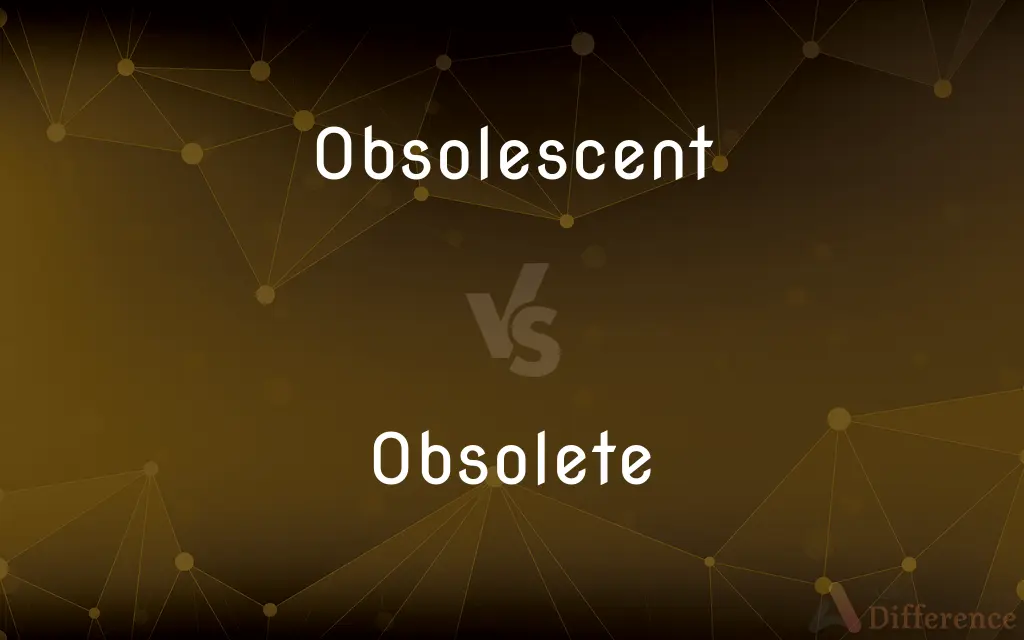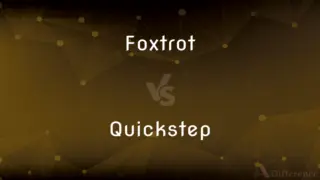Obsolescent vs. Obsolete — What's the Difference?
By Tayyaba Rehman & Urooj Arif — Updated on March 27, 2024
Obsolescent refers to the process of becoming outdated, while Obsolete means something is already outdated or no longer in use.

Difference Between Obsolescent and Obsolete
Table of Contents
ADVERTISEMENT
Key Differences
Obsolescent describes a state of transitioning towards obsolescence, indicating that an item, technology, or idea is on the verge of becoming outdated but is still in use or circulation. For example, while VHS tapes became obsolescent with the rise of DVDs and digital streaming, they were still found in some homes and stores. On the other hand, Obsolete refers to something that has already passed out of use or fashion, rendered redundant by newer forms or technologies. An example is the typewriter, which, for most practical purposes, has been replaced by computers and is considered obsolete.
The distinction between obsolescent and obsolete lies in their current usability and relevance. An obsolescent object or technology might still serve a purpose or function for a while, even as it's being phased out. It's in a transitional phase where its replacement is emerging but hasn't taken over completely. Conversely, something obsolete has lost its utility and is no longer produced or used, having been fully replaced by newer alternatives. For instance, floppy disks are now obsolete, as they've been replaced by USB drives and cloud storage solutions.
In terms of timing, obsolescent is a phase that precedes becoming obsolete. It’s a warning signal that innovation or change is on the horizon, suggesting that the time to seek or adopt alternatives is approaching but not yet critical. Obsolete, however, marks the end of the line—the point at which an item or concept has been fully superseded and is no longer a viable choice for new or continued use.
The concept of being obsolescent can also apply to skills or practices that are becoming less relevant due to technological advances or societal changes, whereas obsolete skills or practices are those that have already lost their relevance. For example, the skill of repairing analog watches might be considered obsolescent as digital and smartwatches become more prevalent, whereas the ability to operate a manual switchboard is largely obsolete.
Both terms serve as markers of progress and innovation, highlighting the lifecycle of technologies, products, and ideas. They reflect the constant evolution within industries, technology, and society, where new advancements continuously reshape the landscape of what's considered modern, relevant, or necessary.
ADVERTISEMENT
Comparison Chart
Definition
Becoming outdated but still in use
No longer in use, completely outdated
Phase
Transition phase
End phase
Current Utility
Still has some utility or function
Has no practical utility or function
Replacement
Replacement is emerging but not dominant
Replacement has already taken over
Examples
VHS tapes during the rise of DVDs
Typewriter in the era of computers
Compare with Definitions
Obsolescent
In the process of being replaced.
Incandescent bulbs are obsolescent, with LEDs becoming the standard for lighting.
Obsolete
Surpassed by new technology.
The typewriter is obsolete, replaced by word processors and computers.
Obsolescent
Becoming outdated.
Fax machines are considered obsolescent due to email and digital communication.
Obsolete
Lacking practical utility.
The use of coal-fired power plants is becoming obsolete due to renewable energy sources.
Obsolescent
Transitioning out of relevance.
Physical newspapers are becoming obsolescent with the rise of digital news.
Obsolete
No longer in use.
Pagers have become obsolete with the advent of cellphones and smartphones.
Obsolescent
Holding on to diminishing utility.
CD players in cars are obsolescent, as digital music and streaming services take over.
Obsolete
No longer produced.
Betamax tapes are obsolete, with production having ceased decades ago.
Obsolescent
Still in use but fading.
Some people still use obsolescent flip phones, though smartphones are now predominant.
Obsolete
Discarded or forgotten.
Manual accounting ledgers are largely obsolete in the era of digital finance software.
Obsolescent
Being in the process of passing out of use or usefulness; becoming obsolete.
Obsolete
No longer in use
An obsolete word.
Obsolescent
(Biology) Becoming reduced during the course of evolution; vestigial or nearly vestigial. Used of an organ or other part of an organism.
Obsolete
Outmoded in design, style, or construction
An obsolete locomotive.
Obsolescent
In the process of becoming obsolete, but not obsolete yet.
Obsolete
(Biology) Vestigial or rudimentary, especially in comparison with related or ancestral species, as the tailbone of an ape. Used of an organ or other part of an organism.
Obsolescent
Going out of use; becoming obsolete; passing into desuetude.
Obsolete
To cause to become obsolete
"The textbook publishers use every trick known to the marketing mind to obsolete their products year after year, thus closing off the possibility of second-hand sales" (Thomas Frank).
Obsolescent
Becoming obsolete
Obsolete
(of words, equipment, etc.) No longer in use; gone into disuse; disused or neglected (often in favour of something newer).
It is speculated that, within a few years, the Internet's speedy delivery of news worldwide will make newspapers obsolete.
Obsolete
(biology) Imperfectly developed; not very distinct.
Obsolete
To cause to become obsolete.
This software component has been obsoleted.
We are in the process of obsoleting this product.
Obsolete
No longer in use; gone into disuse; disused; neglected; as, an obsolete word; an obsolete statute; - applied chiefly to words, writings, or observances.
Obsolete
Not very distinct; obscure; rudimental; imperfectly developed; abortive.
Obsolete
To become obsolete; to go out of use.
Obsolete
Old; no longer in use or valid or fashionable;
Obsolete words
An obsolete locomotive
Outdated equipment
Superannuated laws
Out-of-date ideas
Obsolete
No longer in use;
Obsolete words
Common Curiosities
Can a product be both obsolescent and obsolete?
A product transitions from being obsolescent to obsolete, so it occupies these states at different times rather than simultaneously.
Are obsolete items worthless?
While obsolete items may lack practical utility, they can hold historical, aesthetic, or collectible value.
What does it mean when a technology becomes obsolescent?
It means the technology is on its way to becoming outdated, but it's still in use or circulation for the time being.
Why do things become obsolete?
Things become obsolete due to advancements in technology, changes in consumer preferences, or more efficient alternatives becoming available.
What impact does obsolescence have on the environment?
Obsolescence can lead to increased waste and environmental impact, emphasizing the need for sustainable production and recycling efforts.
How can I tell if something is obsolescent?
If newer alternatives are emerging and the current item or technology is less frequently used or produced, it may be obsolescent.
Is it possible to prevent a product from becoming obsolete?
While preventing obsolescence entirely may be difficult, continuous innovation and adaptation can prolong a product's relevance.
How do companies manage obsolescent products?
Companies may phase out obsolescent products, offer upgrades, or pivot to new technologies to stay relevant.
Can obsolescence be reversed?
In some cases, retro trends or technological revivals can bring obsolete items back into relevance, though this is rare.
Does obsolescence affect all industries equally?
No, industries with rapid technological advancements, like electronics, tend to experience obsolescence more quickly than others.
How does the concept of planned obsolescence fit in?
Planned obsolescence is a strategy where products are designed to become obsolete after a certain period to encourage consumers to purchase newer models.
Can skills become obsolescent or obsolete?
Yes, as technology and societal needs evolve, certain skills can become less relevant or no longer necessary.
What role do consumers play in the obsolescence process?
Consumer demand and adoption of new technologies can accelerate the obsolescence of existing products.
How can businesses adapt to rapid obsolescence?
Businesses can adapt by innovating, staying ahead of trends, and ensuring their products and services evolve with consumer needs.
What are the economic implications of obsolescence?
Obsolescence can drive economic growth through new products and industries, but also poses challenges in waste management and resource utilization.
Share Your Discovery

Previous Comparison
Initiative vs. Project
Next Comparison
Foxtrot vs. QuickstepAuthor Spotlight
Written by
Tayyaba RehmanTayyaba Rehman is a distinguished writer, currently serving as a primary contributor to askdifference.com. As a researcher in semantics and etymology, Tayyaba's passion for the complexity of languages and their distinctions has found a perfect home on the platform. Tayyaba delves into the intricacies of language, distinguishing between commonly confused words and phrases, thereby providing clarity for readers worldwide.
Co-written by
Urooj ArifUrooj is a skilled content writer at Ask Difference, known for her exceptional ability to simplify complex topics into engaging and informative content. With a passion for research and a flair for clear, concise writing, she consistently delivers articles that resonate with our diverse audience.
















































